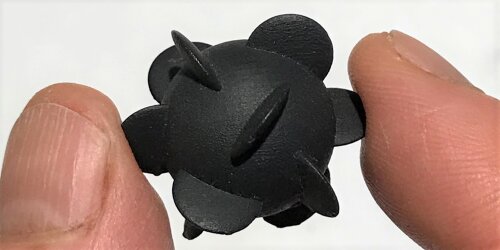A small team of researchers from Wesleyan University, Aix Marseille University and Gothenburg University has attempted to test Lord Kelvin’s isotropic helicoid theory by building several test objects and dropping them in a tub of water. In their paper published in the journal Physical Review Letters, the group describes how they constructed their objects, how they tested them and what they observed.
Nearly a century and a half ago, famed mathematician Lord Kelvin proposed that there should exist an object that if created in the right way, would look the same from any direction, and would spin naturally if dropped into a tank of water. He called his proposed object an isotropic helicoid and suggested that it would likely be a sphere with fins placed on its surface, some at 45° angles to the center circle, some at 90°. The researchers believe it is likely that attemps have been made to test Kelvin’s theory, but they could find no evidence of it in research texts. They suggest that most such attempts likely involved construction of objects that had defects, preventing such efforts from being documented. In the new effort, researchers used a modern means of producing such a desired object—3D printing.
They created several isotropic helicoids, with slight differences in the size and shape of the fins. They then dropped each of their creations into a tank of water and watched to see if any of them began to spontaneously spin. None did; all dropped straight to the bottom of the tank. They then looked into the possibility of there being a slight rotation with one or more of their objects that was too small to be seen with casual observation. To find out if that might be the case, they went back to their physics texts. In looking at the hydrodynamic effects involved, they ran some calculations that showed that there should have been some coupling between their object and the water it was passing through, which suggested that there should have been some turning—it was just too small to see. The team has already begun work on a new design for an isotropic helicoid that will demonstrate enough spin to be seen.
Fire ants found to create ‘appendages’ on self-made rafts when put in water
More information:
Darci Collins et al, Lord Kelvin’s isotropic helicoid, Physical Review Fluids (2021). DOI: 10.1103/PhysRevFluids.6.074302 . On Arxiv: arxiv.org/abs/2006.08282
2021 Science X Network
Citation:
Test of Lord Kelvin’s isotropic helicoid ideas fail to prove theory correct (2021, July 19)
retrieved 19 July 2021
from https://phys.org/news/2021-07-lord-kelvin-isotropic-helicoid-ideas.html
This document is subject to copyright. Apart from any fair dealing for the purpose of private study or research, no
part may be reproduced without the written permission. The content is provided for information purposes only.



